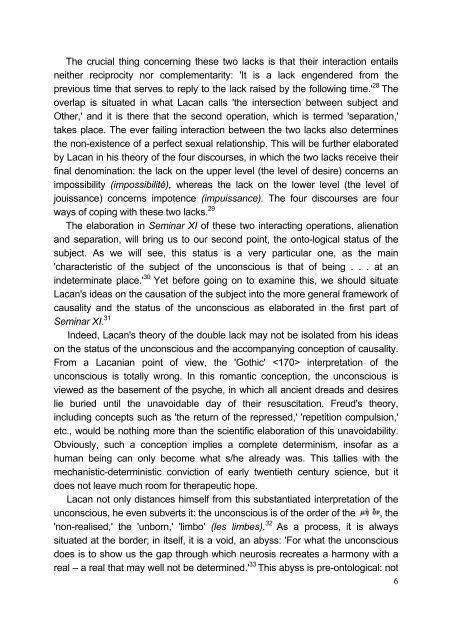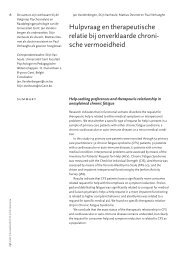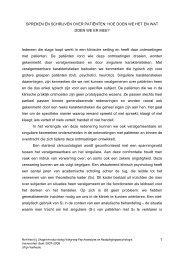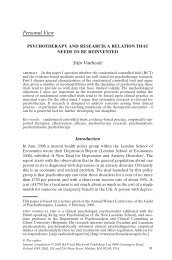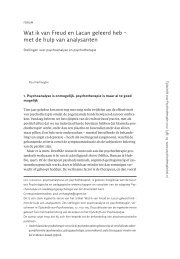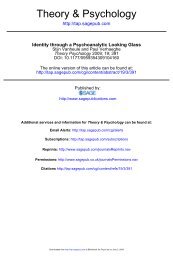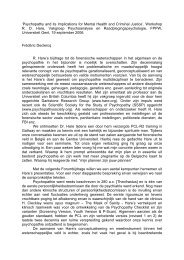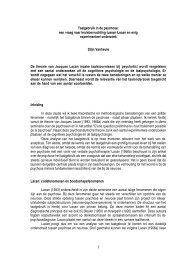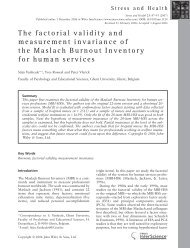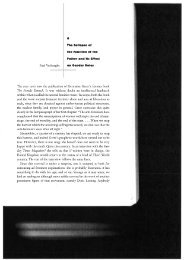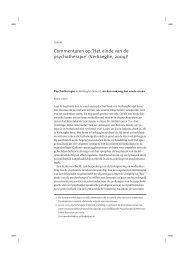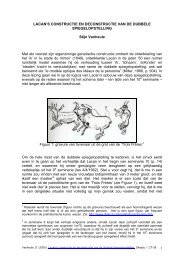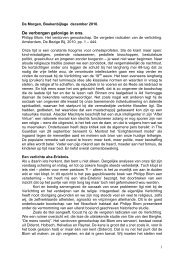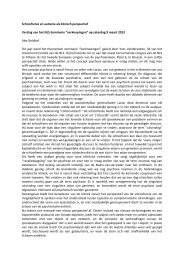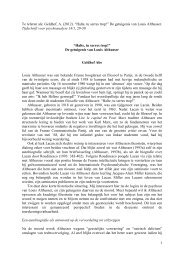Causation and Destitution of a Pre-ontological Non-entity
Causation and Destitution of a Pre-ontological Non-entity
Causation and Destitution of a Pre-ontological Non-entity
Create successful ePaper yourself
Turn your PDF publications into a flip-book with our unique Google optimized e-Paper software.
The crucial thing concerning these two lacks is that their interaction entailsneither reciprocity nor complementarity: 'It is a lack engendered from theprevious time that serves to reply to the lack raised by the following time.' 28 Theoverlap is situated in what Lacan calls 'the intersection between subject <strong>and</strong>Other,' <strong>and</strong> it is there that the second operation, which is termed 'separation,'takes place. The ever failing interaction between the two lacks also determinesthe non-existence <strong>of</strong> a perfect sexual relationship. This will be further elaboratedby Lacan in his theory <strong>of</strong> the four discourses, in which the two lacks receive theirfinal denomination: the lack on the upper level (the level <strong>of</strong> desire) concerns animpossibility (impossibilité), whereas the lack on the lower level (the level <strong>of</strong>jouissance) concerns impotence (impuissance). The four discourses are fourways <strong>of</strong> coping with these two lacks. 29The elaboration in Seminar XI <strong>of</strong> these two interacting operations, alienation<strong>and</strong> separation, will bring us to our second point, the onto-logical status <strong>of</strong> thesubject. As we will see, this status is a very particular one, as the main'characteristic <strong>of</strong> the subject <strong>of</strong> the unconscious is that <strong>of</strong> being . . . at anindeterminate place.' 30 Yet before going on to examine this, we should situateLacan's ideas on the causation <strong>of</strong> the subject into the more general framework <strong>of</strong>causality <strong>and</strong> the status <strong>of</strong> the unconscious as elaborated in the first part <strong>of</strong>Seminar XI. 31Indeed, Lacan's theory <strong>of</strong> the double lack may not be isolated from his ideason the status <strong>of</strong> the unconscious <strong>and</strong> the accompanying conception <strong>of</strong> causality.From a Lacanian point <strong>of</strong> view, the 'Gothic' interpretation <strong>of</strong> theunconscious is totally wrong. In this romantic conception, the unconscious isviewed as the basement <strong>of</strong> the psyche, in which all ancient dreads <strong>and</strong> desireslie buried until the unavoidable day <strong>of</strong> their resuscitation. Freud's theory,including concepts such as 'the return <strong>of</strong> the repressed,' 'repetition compulsion,'etc., would be nothing more than the scientific elaboration <strong>of</strong> this unavoidability.Obviously, such a conception implies a complete determinism, ins<strong>of</strong>ar as ahuman being can only become what s/he already was. This tallies with themechanistic-deterministic conviction <strong>of</strong> early twentieth century science, but itdoes not leave much room for therapeutic hope.Lacan not only distances himself from this substantiated interpretation <strong>of</strong> theunconscious, he even subverts it: the unconscious is <strong>of</strong> the order <strong>of</strong> the , the'non-realised,' the 'unborn,' 'limbo' (les limbes). 32 As a process, it is alwayssituated at the border; in itself, it is a void, an abyss: 'For what the unconsciousdoes is to show us the gap through which neurosis recreates a harmony with areal – a real that may well not be determined.' 33 This abyss is pre-<strong>ontological</strong>: not6


